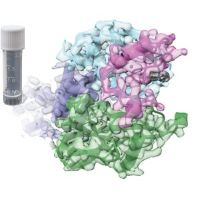Specification
| Organism | Mus musculus (Mouse) |
| Expression Host | E.Coli |
| Tag Info | Tag-Free |
| Purity | >96% as determined by SDS-PAGE and HPLC. |
| Uniprot ID | O89093 |
| Uniprot Entry Name | CCL20_MOUSE |
| Gene Names | Ccl20,Larc,Scya20 |
| Alternative Names | Beta-chemokine exodus-1, CC chemokine ST38, Liver and activation-regulated chemokine, Macrophage inflammatory protein 3 alpha, MIP-3-alpha |
| Expression Region | Full Length of Mature Protein (28-97aa) |
| Molecular Weight | 8.0 kDa |
| Endotoxin | Less than 1.0 EU/µg as determined by LAL method. |
| Sequence | ASNYDCCLSY IQTPLPSRAI VGFTRQMADE ACDINAIIFH TKKRKSVCAD PKQNWVKRAV NLLSLRVKKM |
| Product Form | Lyophilized powder (Lyophilized from a 0.2 µm filtered PBS, pH 7.4) |
| Reconstitution | Please reconstitute protein in deionized sterile water and we recommend that briefly centrifuge thevial prior to opening the vial .We recommend aliquot for long-term storage at -20℃/-80℃. |
Background
| Relevance | Chemotactic factor that attracts lymphocytes and, slightly, neutrophils, but not monocytes. May be involved in formation and function of the mucosal lymphoid tissues by attracting lymphocytes and dendritic cells towards epithelial cells. {ECO:0000250}. |
| Function | Acts as a ligand for C-C chemokine receptor CCR6. Signals through binding and activation of CCR6 and induces a strong chemotactic response and mobilization of intracellular calcium ions |
| Involvement in disease | |
| Subcellular Location | Secreted |
| Protein Families | Intercrine beta (chemokine CC) family |
| Tissue Specificity | Thymic medulla (at protein level). Prominently expressed in the small intestine, colon and appendix. Also found in thymus, spleen, lymph node and lung. The long form might be dominant in intestinal, and the short form in lymphoid tissues. Expressed by IL17 producing helper T-cells (Th17). |
| Pathway |
QC Data
| Note | Please contact us for QC Data |
| Product Image (Reference Only) |  |

